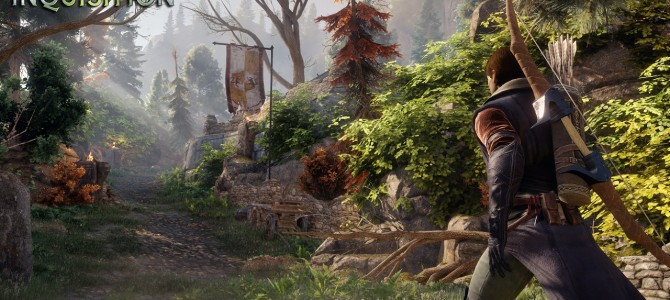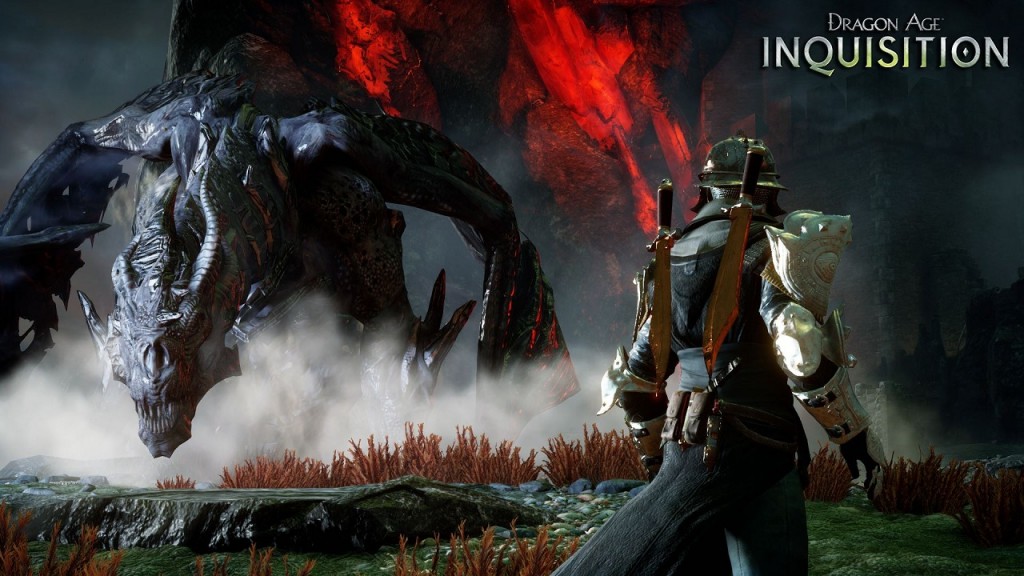
I’m deeply skeptical of conservative reviewers of culture genres like music, film, television, video games and sports because the default mode seems to be: if it’s popular, we hate it and we hate its makers. The latest installment of this phenomena is on display at Breitbart.com, where Milo Yiannopoulos reviews “Dragon Age: Inquisition.”
“Inquisition” is the latest sequel in an award-winning role-playing game (RPG) series by popular developer BioWare. BioWare, for the non-gamers reading this, is responsible for a large portion of the western RPG success stories over the past twenty years, including the “Baldur’s Gate,” “Star Wars: Knights of the Old Republic,” and “Mass Effect” series.
I’m on my sixteenth hour of “Inquisition” at the moment, and I’m not even close to completing it. I’m currently splitting time between it, “Shadow of Mordor,” and the recently released Halo collection. And my job. (Right, mustn’t forget my job.) The game is gorgeous, featuring BioWare’s trademark standout artwork and world-building skills. Like most BioWare video games, it has so much background content, right down to in-game books, songs, and religious and moral disputes, that the average gamer is never going to find time to experience it all. But that’s not the point. The point is immersion, which “Inquisition” handles nicely with BioWare’s usual great cast of voice actors and delightful scripts. I haven’t noticed any bugs or glitches or visual stuttering, although I can’t be sure I shouldn’t be hearing more party banter than I am. I’m playing on the Xbox One, by the way.

Yiannopoulos, on the other hand, starts his review of “Inquisition” with a history of BioWare and its failings in light of the social movement known as Gamergate, and tells his readers that mainstream reviewers (in his mind: “social justice warriors”) gave the game high marks. Predictably, Yiannopoulos then disagrees with the high scores of mainstream outlets, calling “Inquisition’s” writing ”sloppy” and complaining about the third-person camera (as if, perhaps, Yiannopoulos never played BioWare’s “Star Wars: Knights of the Old Republic” or “Mass Effect” video games?). He then turns to the artwork, which he slams as “visually unattractive,” before sneering that he’s not a “console peasant” and so cannot say what the game looks like on consoles. (Well, then.) He also complains about “horrific DRM,” but as a mere console peasant, I don’t have to worry about that.
You Don’t Have to Get Romantic to Play ‘Inquisition’
“Inquisition,” which is marketed to adult gamers, includes optional romance storylines that involve courtship and sex. This is the thing that really gives Yiannopoulos indigestion: “Inquisition,” like most of BioWare’s offerings for the past decade, includes a few gay and lesbian romance options in addition to the half-dozen straight romance options. But it does not include the “dozens of gay and lesbian romance storylines or sex scenes” that Yiannopoulos frets about in his review, which makes his concluding rant about “grating, gratuitous homosexuality” and his stereotypical anti-lesbian tirade baffling.
To be clear for folks who have never played a BioWare RPG, gamers don’t have to complete any of the romance side quests, gay or straight, because they aren’t relevant to the plot or conclusion of the games and don’t appear unless you opt into them. “Inquisition” is no different. The gamer can play a male or female character of his choosing and pursue any romance storyline that he chooses or, if videogame romance in a fantasy setting isn’t his thing, none of them. Gamers don’t have to see or hear about the gay and lesbian romance options in-game unless they choose to.
You Don’t Really Get Gaming or Popular Culture, Do You
Which is why Yiannopoulos’ bizarre fixation on the optional gay content gives his game away. Gamergate hatred of BioWare puts the lie to the claim from Gamergate’s more media-savvy members that Gamergate’s object wasn’t to exclude women and gays from gaming. Gamergate supporters insisted they just didn’t want the social justice warriors to ruin their fun with politically correct scolding. But BioWare is probably the best example of a game maker who offered inclusive options (that is, gay and lesbian content) without doing away with any of the straight content, and was nevertheless excoriated by angry Gamergate members anyway.
Setting aside his anti-gay preoccupation, Yiannopoulos’ claim that “Inquisition” retconned the plot from the previous Dragon Age games so wrong that it’s not even wrong. Rather, it’s unclear whether Yiannopoulos even played “Inquisition.” “Origins” and “Dragon Age 2,” the preceding games in the series, featured several vastly different endings based on the choices that the gamer made along the way.
Now, it is obviously unreasonable to complain that the “Inquisition” backstory fails to incorporate mutually exclusive end games in “Origins” and “Dragon Age 2” in the default game, as Yiannopoulos does. But—and here’s where Yiannopoulos’ ignorance of the game he purports to review really shines through—BioWare actually set up a system whereby you could go onto a website, select the end states for “Origins” and “Dragon Age 2” you want, and it provides you an alternate starting game state in “Inquisition” that incorporates the backstory that you selected. It’s a nice offer to customize a long-running video-game series, and no other game makers have anything like it. I don’t know why Yiannopoulos doesn’t know about it, but it’s called Dragon Age Keep, and his ignorance of it is just one more signal he has no business reviewing the video game.
Andrew Breitbart used to remark that “politics is downstream from culture.” Conservatives who reject culture—particularly with sneering, unthinking rejection—will inevitably find themselves isolated in politics. This is why I struggle to understand why conservative critics always seem to deliberately set out to badmouth popular cultural phenomena. It doesn’t endear them to anyone who doesn’t already agree with them (“humbug!”) and it makes them appear further and further out of touch with the society we live in.
But you see it time and again with folks who repeatedly moan that Hollywood doesn’t make good movies anymore. Which leads to the obvious question, “If you reflexively hate what Hollywood does now, why in God’s name are you reviewing new movies? Hell, why are you even watching new movies?” The same question applies here. Yiannopoulos started his review by complaining that his readers had to beg him to review “Inquisition.” Why, oh why, didn’t he just decline, since he already hated BioWare and its “soulless, miserable, agenda-driven husks” so much? It would have been more honest than the factually and culturally out-of-touch column he produced.








